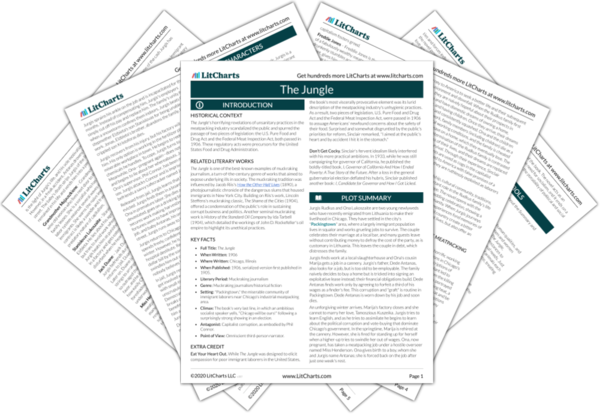The Dehumanizing Evils of Capitalism
The Jungle was written to demonstrate the evils of the capitalist system in America. In the novel, Upton Sinclair shows the way the capitalist system exploits the working class, gives absolute power to the wealthy few, and forces individuals to act only out of self-interest, regardless of the suffering of others. The Jungle portrays the many vices and injustices that result from capitalism, including horrific working conditions, child labor, political corruption, prostitution, drinking, cheating, and…
read analysis of The Dehumanizing Evils of CapitalismThe Immigrant Experience and Disillusionment
The Jungle tells the story of one Lithuanian family's journey to America to seek a better life and their subsequent disillusionment and downfall. When the Rudkus family first arrive, they are naively hopeful about their prospects in America and have domestic dreams of owning a home, marrying, and having children. Once they arrive, their dreams are cruelly and consistently squashed. Ona and the children must go to work, family members (including children) die as a…
read analysis of The Immigrant Experience and DisillusionmentThe Horrors of the Meatpacking Industry
The Jungle is as an exposé of the horrific working conditions and unsanitary conditions in Chicago's meatpacking industry. Sinclair's grotesque descriptions of conditions and procedures in the meatpacking plant led to subsequent reforms in food safety regulation. From the killing beds to the fertilizer plant, the meatpacking plant is portrayed as a Hell on Earth, a place of blistering cold and burning heat, a place where a man might fall unnoticed into a boiling vat…
read analysis of The Horrors of the Meatpacking Industry
Family, Masculinity, and Individualism
The Jungle shows how capitalism ruptures family ties and forces individuals to think only of self preservation. As the novel progresses, ideals of home, domesticity, and romantic love are steadily crushed. In the beginning, the Rudkus family live in one home together, but over the course of the book, they gradually die or disperse. After Jurgis's wife Ona dies during childbirth and his son Antanas drowns in the street, Jurgis leaves his family and…
read analysis of Family, Masculinity, and IndividualismLabor Rights and Socialism
The Jungle traces Jurgis' journey from naïveté about the workings of capitalism to awareness of his position as an exploited worker and the workings of the capitalist machine. At first, Jurgis doesn't understand the discontent of other workers or the need for unions or workers' rights. He gradually becomes aware of the injustices in the meatpacking plant, and joins the union, only to realize that the union is corrupt and ineffective. Beaten down by…
read analysis of Labor Rights and Socialism











